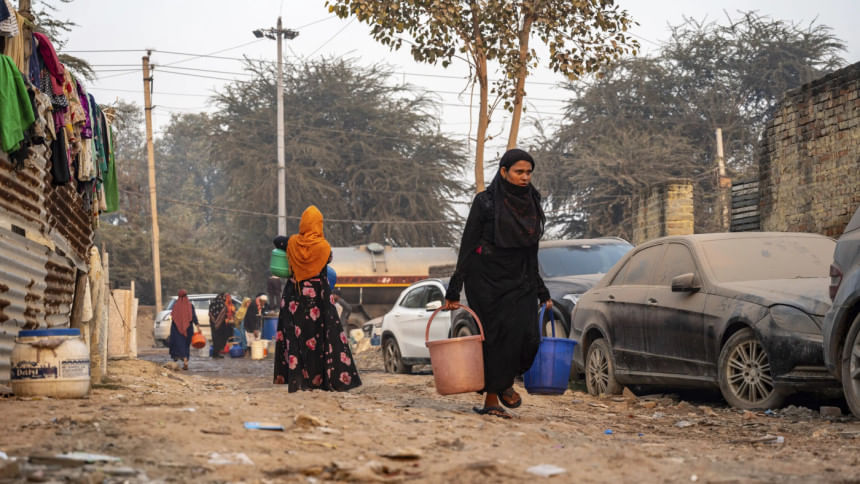India expelling Rohingya to Bangladesh without rights protections: HRW

Indian authorities have expelled scores of ethnic Rohingya refugees to Bangladesh and Myanmar without rights protections since May 2025, Human Rights Watch said today.
The authorities have arbitrarily detained several hundred more, mistreating some of them, the rights organisations claimed in a report published on Thursday.
In May, states in India governed by the Hindu nationalist Bharatiya Janata Party (BJP) initiated a campaign to expel Rohingya and Bengali-speaking Muslims for being "illegal immigrants." Those expelled to Bangladesh included at least 192 Rohingya refugees despite being registered with the United Nations refugee agency (UNHCR), the report said.
The authorities also put 40 Rohingya refugees on a ship near the Myanmar coast and forced them to swim ashore, the HRW said, adding, dozens more have fled to Bangladesh to avoid the crackdown.
"The Indian government's expulsion of Rohingya refugees shows an utter disregard for human life and international law," said Elaine Pearson, Asia director at HRW.
"The actions taken against these refugees, who have fled atrocities and persecution in Myanmar, reflect the ruling BJP's policy to demonise Muslims as 'illegal' migrants."
Human Rights Watch interviewed nine Rohingya men and women in the Cox's Bazar refugee camps in Bangladesh who had recently arrived from India. Six who had been expelled in May alleged that Indian authorities assaulted them and seized their money, mobile phones, and UNHCR registration cards. The other three fled to Bangladesh, one each from Jammu and Kashmir, Andhra Pradesh, and Delhi, fearing arbitrary detention after police threatened them, the report mentioned.
An estimated 40,000 Rohingya live in India, at least 20,000 of whom are registered with the UN refugee agency. Although India is not a party to the 1951 UN Refugee Convention or its 1967 Protocol, India is bound by the customary international law principle of nonrefoulement, which prohibits countries from returning or expelling people to places where they face threats to their lives or freedom, the HRW said.
A 37-year-old Rohingya woman who had been detained in Goalpara district in India's Assam State, said that Indian Border Security Force officials forced her, her husband, and their three children into Bangladesh at gunpoint on the night of May 6. "When my husband asked the officials where we should go, as we had no money and didn't know the area, they were forcing us to cross; they slapped him so hard he still can't hear properly," she said. "They threatened to kill us if we spoke further."
The family had fled Myanmar in 2012 to escape the military's ethnic cleansing campaign against the Rohingya in Rakhine State, but ended up detained for over a decade in jails in Assam.
On May 6, Indian authorities arbitrarily detained 40 Muslim and Christian Rohingya refugees, including 13 women, in Delhi under the pretext of collecting data needed to identify them. The authorities flew the Rohingya to the Andaman and Nicobar Islands and forced them to board an Indian naval vessel there, which set sail. The ship's crew allegedly beat and interrogated them. A Rohingya Christian man in Delhi whose brother was among those expelled told Human Rights Watch that once the ship was close to the Myanmar coast, the crew gave the refugees life jackets and then tossed them into the sea, according to the report.
The refugees swam ashore, reaching Launglon township in Myanmar's Tanintharyi Region. One used a fisherman's phone to contact family members. "We were treated like the worst criminals," he told a relative. "One officer said, 'No one will speak for you. No one will hold us accountable if we kill you all.' Some of us could swim and helped those who could not reach the shore."
The UN special rapporteur on human rights in Myanmar, Tom Andrews, said the incident demonstrated "blatant disregard for the lives and safety of those who require international protection."
Fearing arbitrary arrests, some Rohingya families decided to flee India for Bangladesh. They said police beat and violently mistreated those fleeing.
A Rohingya man, 40, a UNHCR-registered refugee who lived in Hyderabad, set out on May 15 with his wife and two children by train with a Rohingya group. However, the police detained the group at a railway station in Tripura State, took information needed to identify them, and then beat them. "They even beat my 4-year-old daughter," he said. "They insulted the women, too. They took our phones and my 20,000 Indian rupees [US$230]. They took everything, even my child's school bag."
The man said that the police handed them over to border officials, who beat the men in the group with lathis (batons), compelled them to make a video, and then forced them across the border into Bangladesh. "They made us say that we were from Bangladesh, that we were trying to enter India, and that the Indian government had arrested us and was sending us back," he said, "They told us that if the Bangladeshi border guards sent us back to India, we would be shot."
In March, the UN special rapporteur wrote to the Indian government raising concerns about widespread, arbitrary, and indefinite detention of refugees and asylum seekers, including Rohingya, from Myanmar. He also raised concerns about detention conditions, including allegations of ill-treatment and beatings, lack of access to adequate medical treatment, deaths in custody, and deportations.
Rohingya refugees previously had some access to education and livelihoods in India, but that policy changed in 2017 when the BJP government "issued detailed instructions for deportation of illegal foreign nationals including Rohingyas."
India's Supreme Court announced that it will decide whether the Rohingya are "refugees" or "illegal entrants," and the rights and protections to which they are entitled. The next hearing is scheduled for September 23.
"The Indian government should immediately end the intimidation, arbitrary detention, and unlawful expulsions of all Rohingya refugees and impartially investigate allegations that they were ill-treated," Pearson said. "Indian authorities should recognize Rohingya as refugees and work with the UN refugee agency to protect their rights."

 For all latest news, follow The Daily Star's Google News channel.
For all latest news, follow The Daily Star's Google News channel. 



Comments